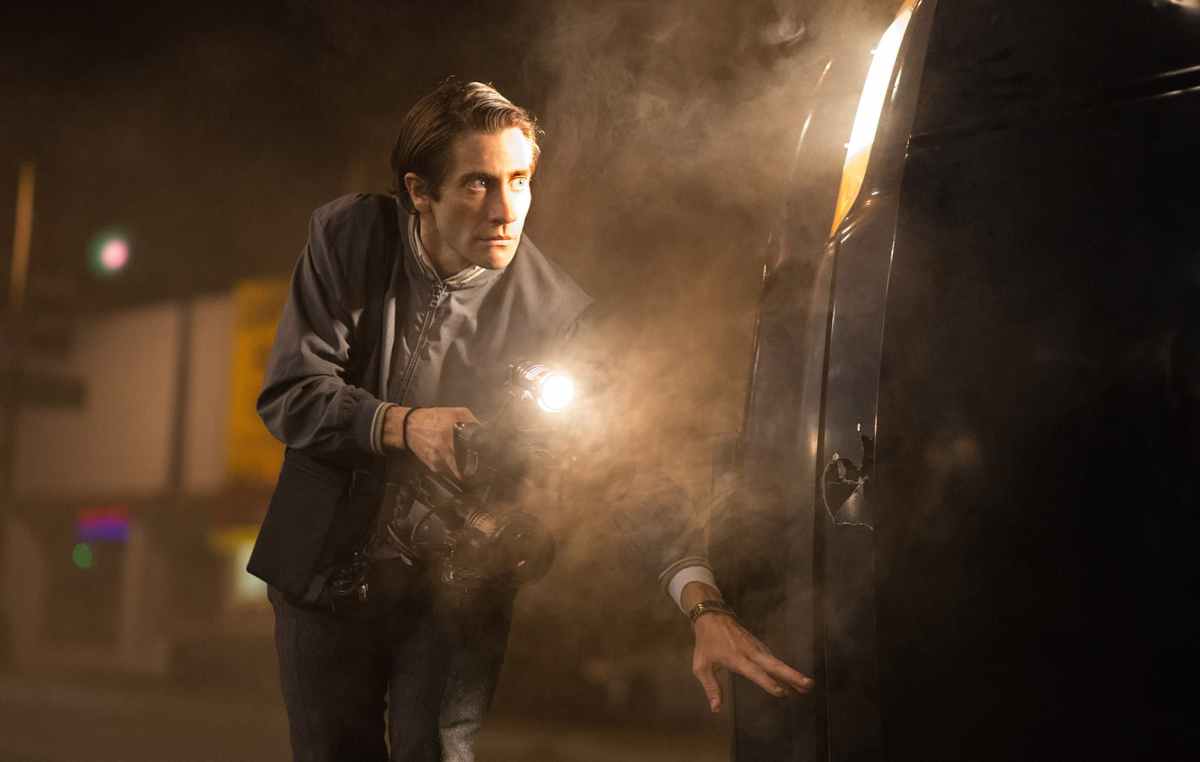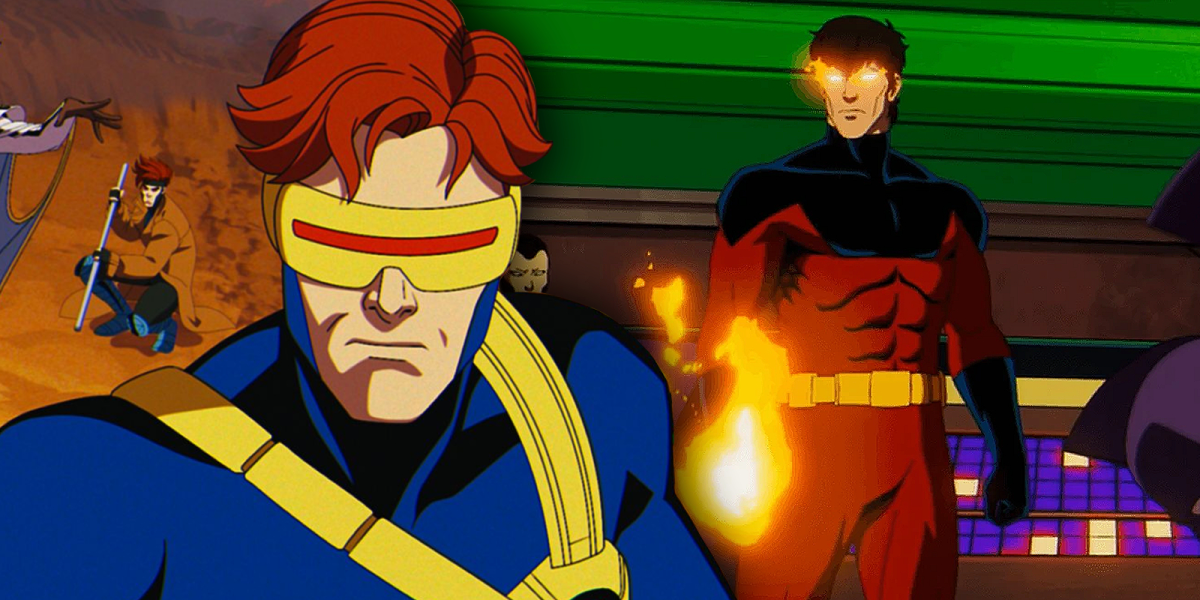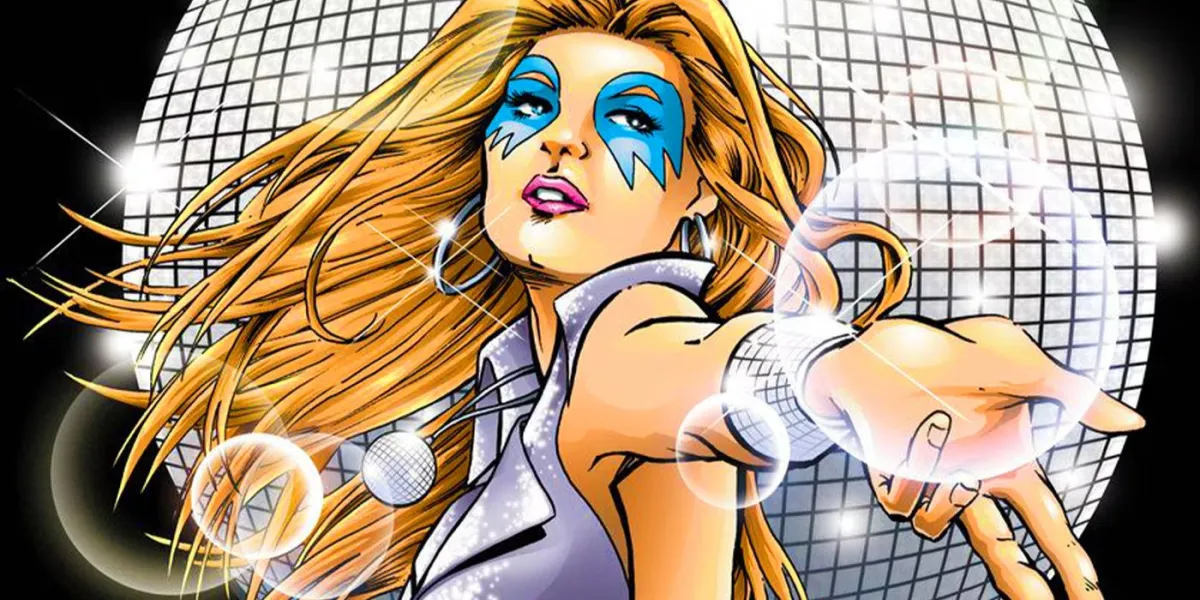Nightcrawler borrows the cinematic language of the vampire movie to provide a compelling — and unsettling — study of its protagonist and the world around him.
Louis Bloom (Jake Gyllenhaal) is not literally a vampire. Repeatedly over the course of the film, he is seen wandering around Los Angeles during the day. He repeatedly breaks into people’s homes without invitation. Indeed, it’s a small irony that it’s Detective Frontieri (Michael Hyatt) who has to ask Lou’s permission to come into his home. Lou himself is visible in mirrors, as demonstrated by one of the film’s most memorable sequences of Lou screaming at his reflection in rage and frustration.
However, writer and director Dan Gilroy borrows the cinematic language of vampire cinema in this gritty neo-noir. Like so many Los Angeles movies, Nightcrawler unfolds largely at night — it is bookended by two shots of the full moon over Los Angeles. Cinematographer Robert Elswit gives everything an uncomfortable neon glow, with the lights often seeming to have a limited effect on holding back the darkness of the City of Angels.
Lou himself is presented as a figure that skirts the edge of the uncanny valley. Jake Gyllenhaal lost 30 pounds for the role, causing the veins on his neck to pull tight against his pale skin. The effect is to communicate that Lou is “literally and figuratively hungry.” Reviews would often discuss Lou as “part vampire, part vulture” or as “a sort of modern-day vampire.” In his analysis of the film, Devin Clark would position Lou’s aesthetic as “somewhere between Lost Boys and Bella Lugosi.”
“I’m tired,” complains his partner Rick (Riz Ahmed) as they start one evening. “Aren’t you tired?” The opposite seems to be true. Lou comes alive at night. He is introduced stealing a chain link fence to sell it for scrap metal, establishing him as a parasite feeding on whatever he can scrounge. He talks in soundbytes cobbled together from online business courses and articles, making him sound like a sentient Forbes article. At one point, Rick chides him, “You don’t understand people.”

Later, Lou offers a chilling response. “What if my problem wasn’t that I don’t understand people, but that I don’t like them?” When Lou pushes Rick to do something that makes Rick uncomfortable, he insists, “I can’t make people do things, Rick.” However, it is apparent that Lou has an eye for human weakness. In his first meeting with Rick, Lou assesses the young man. “You trick,” he states. When Rick protests, Lou clarifies, “Wasn’t a question.” It’s implied Lou wants a sidekick that he can control.
Like a vampire, Lou trades in blood. The film follows Lou as he becomes a “nightcrawler,” one of the roving freelance videographers who wander through late-night Los Angeles hoping to capture human suffering on film and sell it to the city’s news networks in the morning. Trying to determine what the channels want, Lou repeatedly comes back to the idea of “blood,” even if the broadcasters themselves try to frame it in loftier terms. Lou has no illusions. “We want victims,” he tells Rick.
Lou’s media point of contact is Nina Romina (Rene Russo), whose name seems to offer a double homage to the character of Mina from Dracula, Jonathan Harker’s blushing bride who is menaced by the Count. In reality, Nina is perhaps a closer analogue to Lucy Westenra, a character whose relationship with Lou is more complicated than simple victimhood. In the film’s only use of the word, it is clarified that Mina works “the vampire shift” at the station — the early morning news coverage.
Nightcrawler presents the news as horror — stories are packaged in language like “Horror in Echo Park” and “Horror House.” Nina frames reporting in terms that evoke horror movies, repeatedly coming back to the narrative of “urban crime creeping into the suburbs” and describing the news’ aesthetic as “a screaming woman running down the street with her throat cut.” Lou’s footage is shot like a horror movie, voyeuristically peering through windows and building suspensefully to reveals.

Gilroy often borrows the cinematic language of vampire movies in characterizing Lou. When Lou sabotages a van belonging to his rival Joe Loder (Bill Paxton), Lou appears at the crime scene in time to loom over Joe on the gurney like a vampire waiting to feast. Showing up to deliver footage to Nina, she asks, “Is that blood on your shirt?” He casually dismisses her observation, “I don’t think so.” He then asks Nina out to dinner at a local Mexican restaurant.
Nightcrawler just shifts the tropes of vampire stories into metaphor. Lou might be visible in mirrors, but Nightcrawler repeatedly suggests that he is uncomfortable on film. “Most of you guys want airtime,” Nina notes, but Lou clarifies that he prefers to remain unseen. He only appears twice in front of the camera — once awkwardly on set and later during a police interrogation. Instead, Lou actively erases himself from footage, pointing the camera away whenever he manipulates a scene.
The camera itself is a key metaphor here. Lou is just as bloodthirsty as a vampire, but Lou feeds through the lens. At the movie’s most graphic crime scene, the brutality is only present through the camera’s viewfinder and later (pixelated) on the morning news. Gyllenhaal’s wide and moist eyes even pop out of the screen like a more traditional vampire’s set of fangs. However, Nightcrawler suggests that Lou is not feeding his own appetites. He is not satisfying his own bloodlust.
Vampires traditionally represent sublimated desire manifesting in a grotesque manner. Stephen King argued that vampires embodied sexual desire, “the ultimate zipless fuck.” By the time Nightcrawler was released, it was arguable that series like Twilight or True Blood had undercut the horror of the vampire as an object of sexual desire. Nightcrawler features its own variant of the classic “seduction over dinner” scene between Lou and Nina, and it is pointedly and monstrously unsexy.

Instead, Lou presents his sexual desire for Nina as an extension of their business partnership; he coerces her into sex, just in a less fantastical manner than most vampires. However, the most sexually charged moment between Nina and Lou does not occur in a restaurant or a bedroom, but as they review his latest footage at the climax. “I want it, obviously,” she states, almost tastefully silhouetted against the monitor bank. He presses, “How much do you want it?”
Lou transfers the vampire’s grotesque lust from sex to capitalism. He is perhaps a pure distillation of Van den Bergh and Kelly’s classic argument that the vampire embodies “the terrible desire for survival, destroying others to maintain his own existence.” This is what Lou does, consistently through Nightcrawler. He exploits the suffering of the people on camera to make a profit, he manipulates Rick to get what he wants, he pressures Nina to secure his position.
Traditionally, zombies rather than vampires have been used as the avatars of monstrous hyper-capitalism — most obviously in George A. Romero’s Dawn of the Dead. However, the zombie is a mindless consumer. In contrast, Nightcrawler uses the tropes of vampire stories to suggest a more motivated pursuit of capitalism. Bruce McClelland has argued that the vampire’s primary function as a fictional monster is “to disperse blame,” to account for things that make society uncomfortable.
“I’m focusing on framing,” Lou boasts to Nina early in the film. “A proper frame not only draws the eye into a picture but keeps it there longer, dissolving the barrier between the subject and the outside of the frame.” This is perhaps the real horror of the almost supernatural Lou Bloom, the peddler in the grotesque imagery that the media eagerly packages and the audience ravenously consumes.
Lou never appears in his own shots, lurking outside the frame. If his film school rhetoric is right, does this mean he doesn’t exist? Does this erase the barrier between the human suffering and the audience consuming it? Maybe Lou isn’t the only bloodthirsty monster, just the most obvious.





